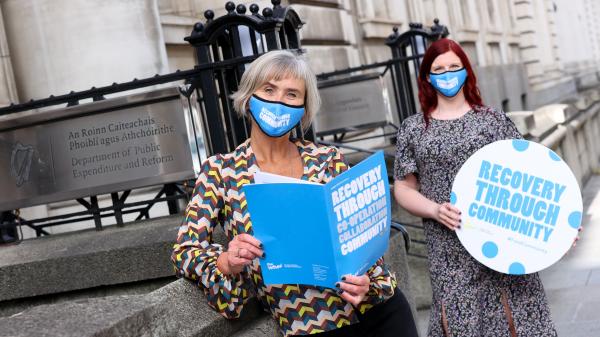IRELAND’S SOCIAL FABRIC IS FRAYING, BUT IT IS NOT TOO LATE TO STOP IT FROM UNRAVELLING
Ireland is currently on the cusp of a second and potentially even more devastating wave of Covid-19. The first wave of the pandemic strained our communities, health services and many businesses to the limit.
These key elements of our society now face a second assault from Covid-19 but in a more fragile state. Health services workers and systems remain excessively strained and stressed and struggling businesses have used up whatever reserves are available.
Community resilience and the charity and community-based organisations and endeavour that sustain it, face the equally bleak prospect of having to confront a largely invisible enemy, but with greatly depleted financial and structural reserves
The cracks in the structures that held society together before the Covid-19 pandemic are widening, and the spectre of a continued debilitation of our economy and society into the coming year is threatening to wedge open these fault lines even further.
Ireland’s charities and community and voluntary organisations are playing a crucial role in sustaining our communities in these most challenging of times. These organisations provide essential services, supports and social outlets to hundreds of thousands of people the length and breadth of the country – and they have innovatively redesigned their services and supports to ensure people remained supported during the lockdown.
At the height of the lockdown, 14,877 community and voluntary organisations across the country joined forces with local authorities to support the most vulnerable people in our communities as part of the Covid-19 Community Outreach programme. Together they mobilised 36,800 volunteers to provide supports to over 135,000 people in their homes.
And they have done all of this while experiencing the biggest collapse in fundraised income since records began. The Wheel, Ireland’s association of charities, is projecting that this will result in losses of around €160m per quarter, which will add up to a €445m funding deficit by the end of the year.
More worryingly still, many organisations are now reporting that they may not survive next year and that their volunteer numbers are collapsing as the activities and events that volunteers like to get involved in have been cancelled. In a recent survey carried out by The Wheel, 82% of organisations were very concerned that they will not have sufficient funding to deliver services next year. The survey also revealed a 64% decline in volunteer numbers.
We take the extent of volunteering in Ireland for granted, and if this collapse cannot be averted then there may be grave long-term consequences for our society as people are left without the services, supports and the human connection provided by the army of a million people who volunteer every year. The character of Irish society itself could change for the worse as opportunities for volunteers to get involved in community life disappear.
Rural communities are supported by volunteers and voluntary organisations. As are many older people, people with disabilities, people with various chronic health conditions and people experiencing economic marginalisation, poverty and social exclusion.
The community and voluntary sector is the social fabric that knits our communities together – and it is this that makes us in many ways the envy of the world when it comes to social cohesion and our sense of community. But this crucial national asset is endangered.
What can we do? Earlier this year, the Government introduced the €35m Stability Fund for Charities and the €5m Social Innovation Fund, to help stabilise the sector. We need a follow-on scheme to provide ongoing support for the hundreds of organisations that benefitted from this scheme and we need additional funds for other organisations that will otherwise face financial collapse in 2021. The Employment Wage Subsidy Scheme should continue to be available to charities as it has played a crucial role in protecting services. Our recent survey shows that 38% of eligible organisations have already received funding through the scheme.
Policymakers should prioritise a range of actions to make life easier for struggling organisations (such as streamlining costly compliance requirements and providing funding on a multi-annual basis to enable long-term planning).
Given that over half of the funding for the charities sector comes from the public purse in grants and service contracts, public-funders need to commit to maintaining existing funding agreements and additional investment is urgently needed in key areas such as disability supports (we estimate that at least €445m will be needed in 2021 to maintain existing services).
The cost of borrowing on international markets has never been lower and there is a consensus among economists that this is likely to remain the case in the medium term. In fact, inflation is so low that the cost of borrowing is effectively negative. We should borrow now to increase investment in social services and in our community and voluntary sector to ensure that the sector, communities and Irish society as a whole, will recover and thrive after the pandemic.
If we fail to act, we will permanently damage the very fabric of our society, and the cost of this will be borne long after the financial impact of the pandemic has faded from memory.
Support our Recovery Through Community Campaign.

